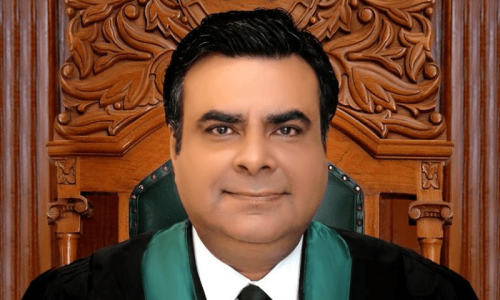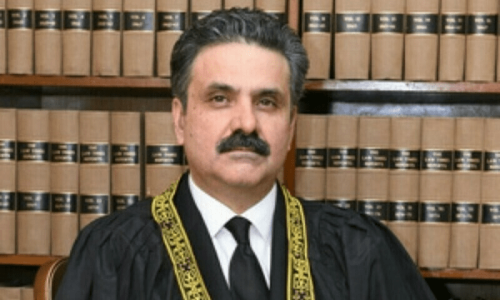WASHINGTON, April 9: One of America’s foremost experts on South Asia has warned that Gen Pervez Musharraf may run into the same problems as Gen Ziaul Haq and Gen Yahya Khan faced, as he seeks to gain political legitimacy for himself.
The expert, Dr Stephen Cohen of the Brookings Institution, said at a conference at Washington’s American University on Monday that while the Pakistan army might have learnt to handle separatist tendencies and religious extremism, no army anywhere could actually turn itself into a government.
The conference, entitled Pakistan: Islam and Civil Society at the Dawn of the Twenty-first Century, scheduled earlier, came in the immediate wake of Gen Musharraf’s decision to hold a referendum to gain five years as President.
Dr Cohen, author of an exhaustive study of the Pakistan army published in 1985, asserted that he saw no breakthrough from overt or covert military rule for Pakistan since the military academies there were still teaching that the country was in peril and politicians could not be trusted to deal with these perils.
He said the army might have become more conservative in outlook over the years like other sectors of society, such as the universities, but it was not directly radical in religious terms. However, it had used radical groups to counter politically liberal tendencies, particularly as represented by the People’s Party, he added.
The military’s credo, Dr Cohen said, was that it was the guardian of the state’s security, and everything that it did flowed from that belief. The generals were in a great position: nobody liked them ruling the country, but nobody could do anything about it because nobody wanted the system to crash.
Dr Cohen was among several participants in the conference, organized by American University’s School of International Service. Others who spoke included Dr Paula Newberg of the United Nations Foundation, Dr Anita Weiss, professor with the international studies programme of the University of Oregon, Dr Riffat Hassan, University of Louisville, and Dr Akbar Ahmad, who holds the Ibne Khaldun chair at American University.
The conference tried to explore new political factors in Pakistan and the pull between religious and secular strains.
Dr Riffat Hussain, whose speech was marked by references to her own efforts in the field of women’s rights and the efforts of an organization set up at her initiative, the International Network for the Rights of Female Victims of Violence in Pakistan, said the discourse in Pakistan had been hijacked by religious extremists at one end and human rights groups at the other. People in the middle had been left out, and she made a plea for this middle group to be empowered and backed.
Dr Hassan said there was strong bias against Islam in the Western world and there was a feeling that recent events had provided an opportunity to turn Muslim countries into secular societies. But, she said, Islam was the matrix in which the people of Pakistan were rooted, and they believed in their Muslim identity. Echoing Gen Musharraf’s thoughts on the issue, she said such people formed the majority, and if America and the West wanted to free the world of terrorism, then it must back the middle.
Dr Bashir Hussain of the University of Wisconsin said the long-term economic and political consequences of Pakistan’s present involvement with the United States could be unfavourable to the country and should be seriously considered.
Dr Akbar Ahmad said there was an element of deja vu in the present political scenario in Pakistan, with a referendum coming and debate on the kind of democracy that suited the country.
All the old questions were being raised again amidst a clash between clerical authority and military authority. The choice appeared to be between the Taliban and the military rule, but the question, Dr Ahmad said, was what had happened to the Quaid-i-Azam and the Quaid’s ideals.















































Dear visitor, the comments section is undergoing an overhaul and will return soon.